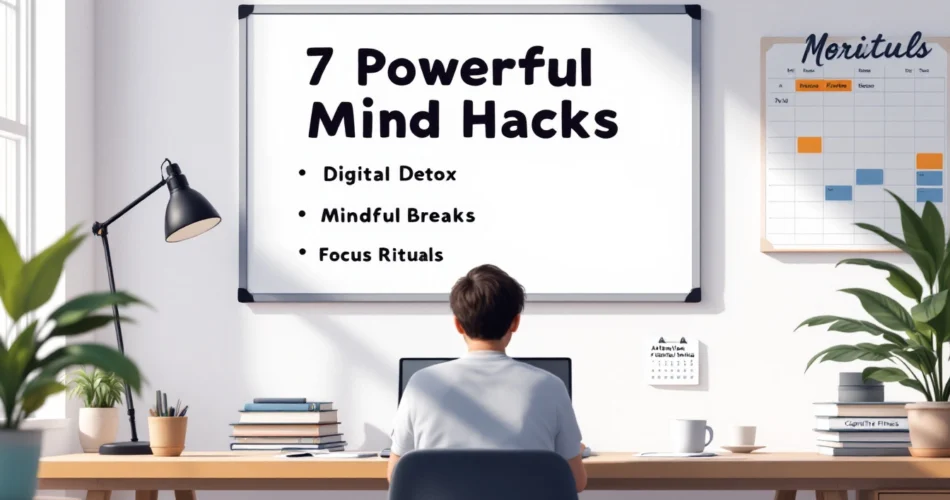Do you ever find yourself endlessly scrolling, checking your phone every few minutes, or struggling to concentrate on a single task? If so, you may be experiencing the early signs of digital brain rot. In a world dominated by smartphones, apps, and constant alerts, our minds are more scattered than ever before. Learning how to avoid digital brain rot is crucial if you want to regain clarity, sharpen focus, and protect your mental well-being. In this guide, we’ll dive into 7 powerful mind hacks that will help you take control of your attention and start using technology intentionally—rather than letting it use you.
Table of Contents
- What Is Digital Brain Rot and Why It Matters
- Hack #1 – Create Tech-Free Zones
- Hack #2 – Manage Your Notifications Wisely
- Hack #3 – Practice Digital Mindfulness
- Hack #4 – Schedule Deep Work Sessions
- Hack #5 – Optimize Your Sleep Hygiene
- Hack #6 – Use Your Brain, Don’t Outsource It
- Hack #7 – Practice Real-World Hobbies & Connections
- FAQs About Digital Brain Rot
- Conclusion & Next Steps
What Is Digital Brain Rot and Why It Matters
Definition of Digital Brain Rot
Digital brain rot refers to the cognitive decline and mental fog caused by overexposure to technology, constant notifications, and passive content consumption. It happens when your brain becomes overloaded, distracted, and addicted to short-term dopamine hits from screens.
Signs You Might Be Experiencing It
- You forget small details frequently
- You struggle to concentrate without checking your phone
- You feel restless when you’re offline
The Science Behind It
Research shows that our attention spans are shrinking, in part due to the constant bombardment of information. Studies published by the American Psychological Association highlight how screen time influences mental fatigue and emotional regulation.
Hack #1 – Create Tech-Free Zones
The Power of Environmental Triggers
Your environment plays a key role in shaping habits. A tech-free dining table or bedroom cues your brain to disconnect from screens and focus on being present.
Where to Start (Bedroom, Dining Area)
Begin by declaring your bedroom and dining area as screen-free zones. This simple step reduces mindless scrolling and improves personal connections.
Benefits for Focus & Relationships
By creating tech-free spaces, you encourage deeper sleep, uninterrupted focus, and stronger personal bonds. Learn more about the benefits of digital detox.

Hack #2 – Manage Your Notifications Wisely
Audit Your Alerts
Eliminate unnecessary notifications—do you really need pings from every app? Turn off alerts for non-essential apps and keep only the ones that matter.
Leverage Focus Modes/Do Not Disturb
Use built-in tools like Focus Mode or Do Not Disturb to control when you receive alerts. This creates mental space for deep concentration.
The Psychology of Attention Fragmentation
Each ping you respond to takes your brain time to refocus. Harvard Business Review reports that interruptions can reduce productivity and leave lingering cognitive costs.
Hack #3 – Practice Digital Mindfulness
Mindful Scrolling Techniques
Instead of doomscrolling, pause and ask: “Why am I opening this app?” This shifts you from autopilot to intentional use.
Set Intentional Usage Goals
Create small goals like checking social media only once an hour or limiting video streaming to a fixed time daily.
Breathing or Mindfulness Apps
Use mindfulness or breathing apps to rewire your relationship with technology. Explore mindfulness practices that promote balance.
Hack #4 – Schedule Deep Work Sessions
Understanding Deep Work
Deep work is the ability to focus without distractions on cognitively demanding tasks. It’s an antidote to digital brain rot.
Using Time-Blocking Techniques
Block out specific times in your calendar for distraction-free work sessions. Treat them like meetings that can’t be skipped.
Creating Rituals to Enter Flow State
Simple rituals, like using noise-canceling headphones or starting with five minutes of journaling, signal your brain to shift into focus mode. Learn more from Cal Newport’s Deep Work principles.
Hack #5 – Optimize Your Sleep Hygiene
The Link Between Screen Time and Sleep
Blue light from screens delays melatonin production and harms your sleep cycle.
Night Routines for Brain Recovery
Adopt habits like journaling or reading with a physical book before bed. Focus on winding down instead of stimulating your brain with digital devices.
Tech Tools for Better Sleep
Install blue-light filters or set “digital sunsets” where all devices are turned off 1–2 hours before bedtime.
Hack #6 – Use Your Brain, Don’t Outsource It
Rely Less on GPS, More on Memory
Challenge yourself to navigate without GPS. This boosts spatial awareness and memory.
Practice Mental Math & Recall Games
Brain teasers, puzzles, and even mental arithmetic keep your neural pathways active and resilient.
Strengthen Neural Pathways with Learning New Skills
Pick up new skills or languages to strengthen cognitive reserves. Read more about how learning strengthens the brain.
Hack #7 – Practice Real-World Hobbies & Connections
Importance of Non-Digital Activities
Physical activities like painting, hiking, or cooking engage your brain differently than screens.
Social Interactions as Brain Boosters
Having face-to-face conversations supports memory retention and enhances emotional well-being.
The Role of Play and Free Exploration
Unstructured play and creative exploration promote problem-solving and resilience. Psychology Today highlights how flow activities can improve cognition.
Frequently Asked Questions
What is digital brain rot, and who does it affect most?
Digital brain rot affects anyone who spends excessive time on screens. Students, office workers, and heavy social media users are most vulnerable.
Can reducing screen time really improve my focus and memory?
Yes. Studies show that lowering screen exposure improves attention span, reduces mental fatigue, and enhances memory.
How can I balance necessary screen time for work without harming my brain?
By practicing intentional digital habits like scheduled breaks, using Focus Mode, and prioritizing offline downtime, you can strike a healthy balance.
Is digital brain rot permanent?
No. With consistent habit changes and cognitive engagement, your brain can recover and rebuild focus.
What are the fastest ways to avoid digital brain rot?
Create tech-free environments, manage notifications, and practice daily mindfulness to see quick improvements.
Conclusion & Next Steps
In today’s fast-paced world, knowing how to avoid digital brain rot is no longer optional—it’s essential to your mental health, productivity, and overall happiness. By applying even one of these 7 hacks, you’ll start noticing more clarity, deeper focus, and stronger connections in your life. Don’t wait until screen fatigue becomes overwhelming—take action today.
Ready to go deeper? Explore more digital wellness strategies and share this article with a friend who could use a mental reset. Your brain will thank you for it.

